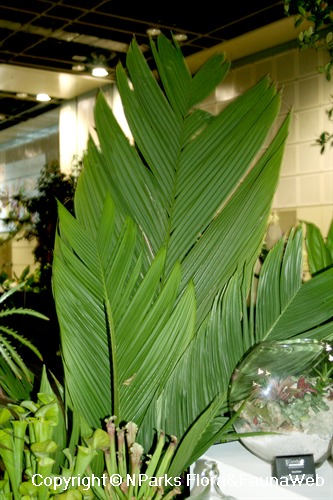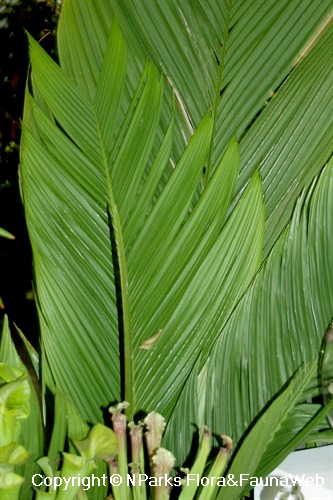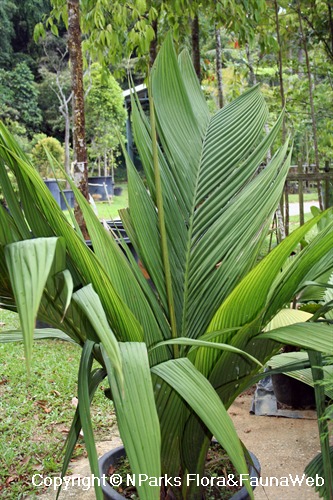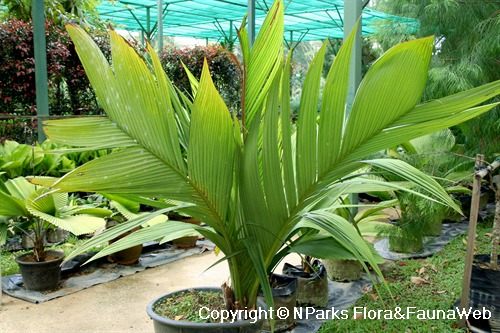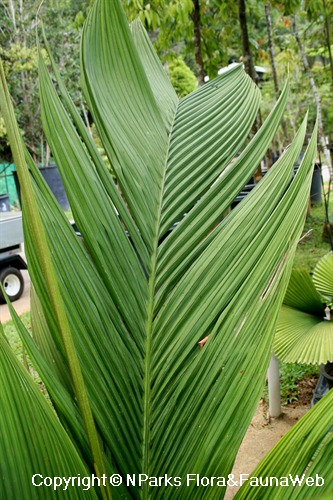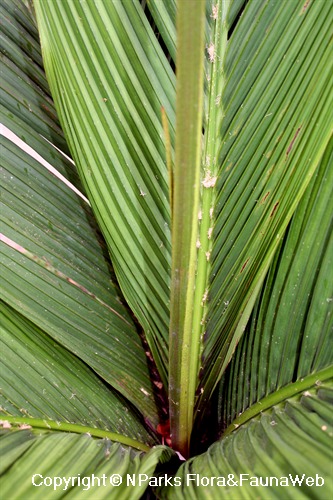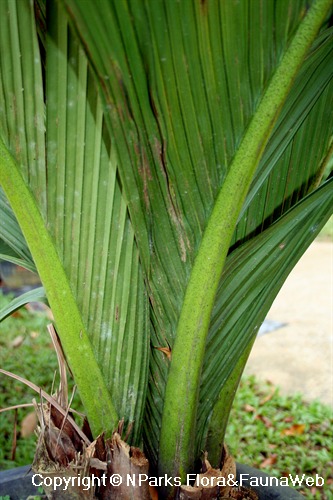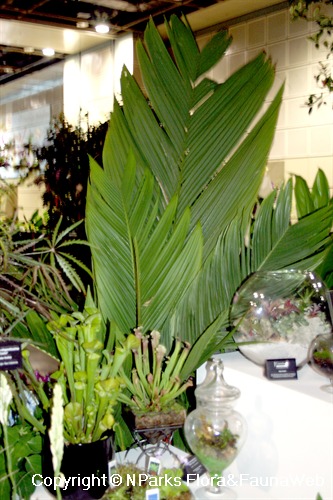
Back
Marojejya darianii J. Dransf. & N. W. Uhl
| Family Name: | Arecaceae (Palmae) |
| Common Name: | Madagascar Big-Leaved Palm, Darian Palm, Ravimbe |
Name
Classifications and Characteristics
| Plant Division | Angiosperms (Flowering Seed Plants) (Monocotyledon) |
|---|---|
| Plant Growth Form | Palm (Solitary Habit) |
| Lifespan (in Singapore) | Perennial |
| Mode of Nutrition | Autotrophic |
| Plant Shape | Fountain (Palm-like) |
| Maximum Height | 6 m to 15 m |
| Maximum Plant Spread / Crown Width | 8 m |
Biogeography
| Native Distribution | Madagascar |
|---|---|
| Native Habitat | Terrestrial (Riverine) |
| Preferred Climate Zone | Sub-Tropical / Monsoonal |
| CITES Protection | True (Appendix II) |
Description and Ethnobotany
| Growth Form | Large solitary palm, up to 15m height, rising from ground like a giant shuttlecock. Specimens growing at stream edge may have bulbous trunk and surface roots. |
|---|---|
| Foliage | Fronds green, deeply-grooved, with conspicuous pointed auricles on frond sheaths; very large (up to 5m long in mature plants) and sail-like, designed to catch falling leaf litter in native rainforest habitat; form is simple and fairly entire, becoming irregularly pinnate only towards V-shaped tip. Species is amongst top two candidates for largest undivided foliage, the other being SE Asian native palm Johannesteijsmannia altifrons (Diamond Joey Palm), which sports totally undivided fronds up to 4m in length. |
| Flowers | Species is monoecious, producing separate female and male (staminate) inflorescences on same plant. Individual flowers small, cream-coloured. |
| Fruit | Fleshy berries, produced in clustered infructescences, reportedly ripening in unusual colour sequence from pink to green to bright red and deep red, and then rusty brown. |
| Habitat | Native to a few isolated locales in Madagascar, found growing in acidic peaty freshwater swamps and very close to waterways in valleys of primary rainforests. Categorized as "Critically Endangered" in IUCN's Red List (2009), protected as CITES II species. |
| Cultivation | Slow-growing and relatively more difficult to grow than other palms. Provide semi-shade, acidic soils rich in organic matter, and lots of water. Mist fronds regularly if used under drier or less humid conditions (eg. as display in air-conditioned interiors). Locate in sheltered spots away from strong winds, which may result in shredded fronds that detract from the palm's natural beauty. Propagate by seeds, which can be germinated in vitro in gelatin medium. |
| Etymology | Genus epithet 'Marojejya' derived from name of the rainforest-covered Marojejy Massif and UNESCO World Heritage Site located in northeastern Madagascar, where the species is endemic to. Species epithet 'darianii' named after American botanist, plant collector, palm enthusiast and "Indiana Jones of plants", Dr Mardy E. Darian (1933 - ) who first discovered the palm in Madagascar. |
Landscaping Features
| Desirable Plant Features | Ornamental Foliage |
|---|---|
| Landscape Uses | General, Focal Plant, Container Planting |
Plant Care and Propagation
| Light Preference | Semi-Shade |
|---|---|
| Water Preference | Moderate Water |
| Plant Growth Rate | Slow |
| Rootzone Tolerance | Fertile Loamy Soils, Waterlogged Soils (Drains Site), Acidic (low pH) Soils |
| Maintenance Requirements | Moderate |
| Propagation Method | Seed |
| Propagule Establishment Remarks | Germinate seed in vitro in gelatin, agar or other medium. |
Foliar
| Foliage Retention | Evergreen |
|---|---|
| Mature Foliage Colour(s) | Green |
| Mature Foliage Texture(s) | Smooth, Raised / Sunken Veins, Thick |
| Foliar Type | Simple / Unifoliate |
| Foliar Shape(s) | Palm Fronds (Simple), Non-Palm Foliage (Lanceolate) |
| Foliar Venation | Parallel |
| Foliar Margin | Entire |
| Foliar Apex - Tip | Emarginate |
| Typical Foliar Area | Megaphyll (>1640.25cm2 ) |
| Leaf Area Index (LAI) for Green Plot Ratio | 2.5 (Palm - Solitary) |
Non - Foliar and Storage
| Trunk Type (Palm) | Solitary Habit, Aboveground |
|---|---|
| Root Type | Underground (Fibrous Root) |
Floral (Angiosperm)
| Flower & Plant Sexuality | Unisexual Flowers , Monoecious |
| Flower Colour(s) | Cream / Off-White |
|---|
| Flowering Habit | Polycarpic |
Fruit, Seed and Spore
| Mature Fruit Colour(s) | Brown |
|---|---|
| Fruit Classification | Simple Fruit |
| Fruit Type | Fleshy Fruit |
Image Repository
Others
| Master ID | 29166 |
|---|---|
| Species ID | 3475 |
| Flora Disclaimer | The information in this website has been compiled from reliable sources, such as reference works on medicinal plants. It is not a substitute for medical advice or treatment and NParks does not purport to provide any medical advice. Readers should always consult his/her physician before using or consuming a plant for medicinal purposes. |

